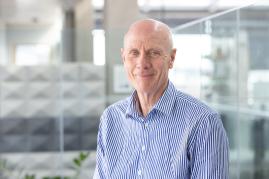
Professor Paul Freemont is the co-founder of the Imperial College Centre for Synthetic Biology and Innovation (2009) and co-founder and co-director of the National UK Innovation and Knowledge Centre for Synthetic Biology (SynbiCITE; since 2013) and Director of the London BioFoundry (since 2016) at Imperial College London. He is also currently the Head of the Section of Structural Biology in the new Department of Infectious Diseases at Imperial. He was previously the Head of the Division of Molecular Biosciences at Imperial (2005-2012), Head of the Imperial College Centre for Structural Biology (2000-2005) having joined Imperial from Cancer Research UK London Research Institute (now known as the Crick Research Institute) where he was a Principle Investigator and Head of Group. In 2019, he led the establishment of the Global Biofoundry Alliance (GBA) comprising 23 institutions on four continents aimed at building and sharing open technology platforms for synthetic biology and currently the chair of the GBA.
His research interests span from understanding the molecular mechanisms of human diseases and infection to developing synthetic biology foundational tools for specific applications including automation. His research group has pioneered the use of cell free extract systems for synthetic biology prototyping and biosensor applications and he is the author of over 240 scientific publications (H-index 74). He is an elected member of European Molecular Biology Organisation and Fellow of the Royal Society of Biology, Royal Society of Chemistry and Royal Society of Medicine and is an Honorary Fellow of the Royal College of Art. He was a co-author of the British Government’s UK Synthetic Biology Roadmap and was a recent member of the Ad Hoc Technical Expert Group (AHTEG) on synthetic biology for the United Nations Convention for Biological Diversity (UN-CBD). He has also appeared regularly on radio and television broadcasts on the subject of synthetic biology and has successfully co-supervised Imperial iGEM teams since 2006.
